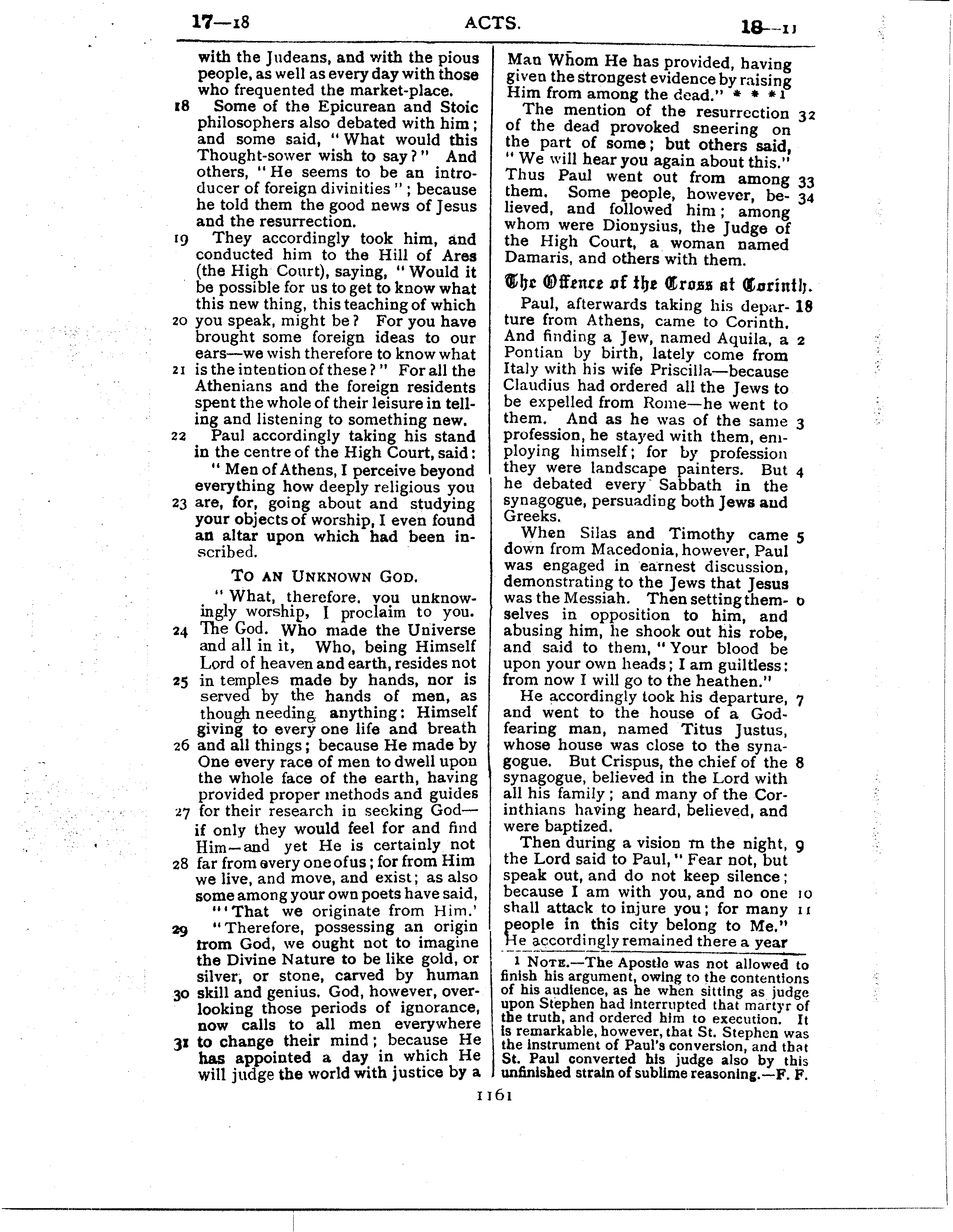Acts of the Apostles - Ferrar Fenton Bible Translation page 1161
The New Testament
17-18
ACTS.:8
Z0 ZI 22 with the judcans, and with the pious people, as well as every day with those who frequented the market-place. Some of the Epicurean and Stoicphilosophers also debated with him; What would this And He seems to be an intro- ; because he told them the good news of jesus and the resurrection. They accordingly took him, and
conducted him to the Hill of Ares Would it be possible for us to get to know what this new thing, this teaching of which you speak, might be? For you have brought some foreign ideas to our ears-—we wish therefore to know what For all the Athenians and the foreign residents spent the whole of their leisure in tell- ing and listening to something new. Paul accordingly taking his stand
in the centre of the High Court, said: ‘ Men of Athens, I perceive beyond
everything how deeply religious you are, for, going about and studying your objects of worship, I even found an altar upon which had been in- scribed. To AN Unknown Gon. What, therefore. vou unknow-
ingly worship, I proclaim to you. F BIS G0d· Who made the Universe and all in it, Who, being Himself Lord of heaven and earth, resides not in temples made by hands, nor is dserve by the hands of men, as though needing anything: Himself giving to every one life and breath
26 and all things; because He made by One every race of men to dwell upon the whole face of the earth, having provided proper methods and guides 27 for their research in seeking God if only they would feel for and find 28 Him-and yet He is certainly not far from every one of u ; for from Him we live, and move, and exist; as also some among your own poets have said, ‘That we originate from Him. 1`herefore, possessing an origin
trom God, we ought not to imagine the Divine Nature to be like gold, or silver, or stone, carved by human skill and genius. God, however, over- looking those periods of ignorance, now calls to all men everywhere to change their mind; because He has appointed a day in which He will judge the world with justice by a
18——1x
Man Whom He has provided, having given the strongest evidence by raising * * *1 The mention of the resurrection
of the dead provoked sneering on We will hear you again about this.’ Thus Paul went out from among them. Some people, however, be- lieved, and followed him; among whom were Dionysius, the judge of the High Court, ag woman named Damaris, and others with them. 33
Eb: ®Eznrz nf tbz Mrnzs at Qnrintli. Paul, afterwards taking his depar-
ture from Athens, came to Corinth. And Ending a jew, named Aquila, a Pontian by birth, lately come from Italy with his wife Priscilla——because Claudius had ordered all the jews to be expelled from Rome—he went to them. And as he was of the same profession, he stayed with them, em- ploying himself; for by profession they were landscape painters. But he debated every` Sabbath in the synagogue, persuading both jews and Greeks. When Silas and Timothy came
down from Macedonia, however, Paul was engaged in earnest discussion, demonstrating to the jews that jesus was the Messiah. Then setting them- selves in opposition to him, and abusing him, he shook out his robe, Your blood be upon your own heads; I am guiltless: from now I will go to the heathen.’ He accordingly took his departure,
and went to the house of a. God- fearing man, named Titus justus, whose house was close to the syna- gogue. But Crispus, the chief of the synagogue, believed in the Lord with all his family ; and many of the Cor· inthians having heard, believed, and were baptized. Then during a vision rn the night,
Fear not, but speak out, and do not keep silence; because I am with you, and no one shall attack to injure you; for many le in this citbel e accordingly remained there a year 1_ §o·rn.·~—The Apostle was not allowed io ir to 18
hnish his argument, owing to the contentions of his audience, as he when sitting as judge upon Stephen had interrupted that martyr of the truth, and ordered him to execution. It is remarkabie, however, that St. Stephen was the instrument of PauI’s conversion, and that St. Paul converted his judge also by this unhnlshed strain of sublime reasonlng.——F. F. II6l
